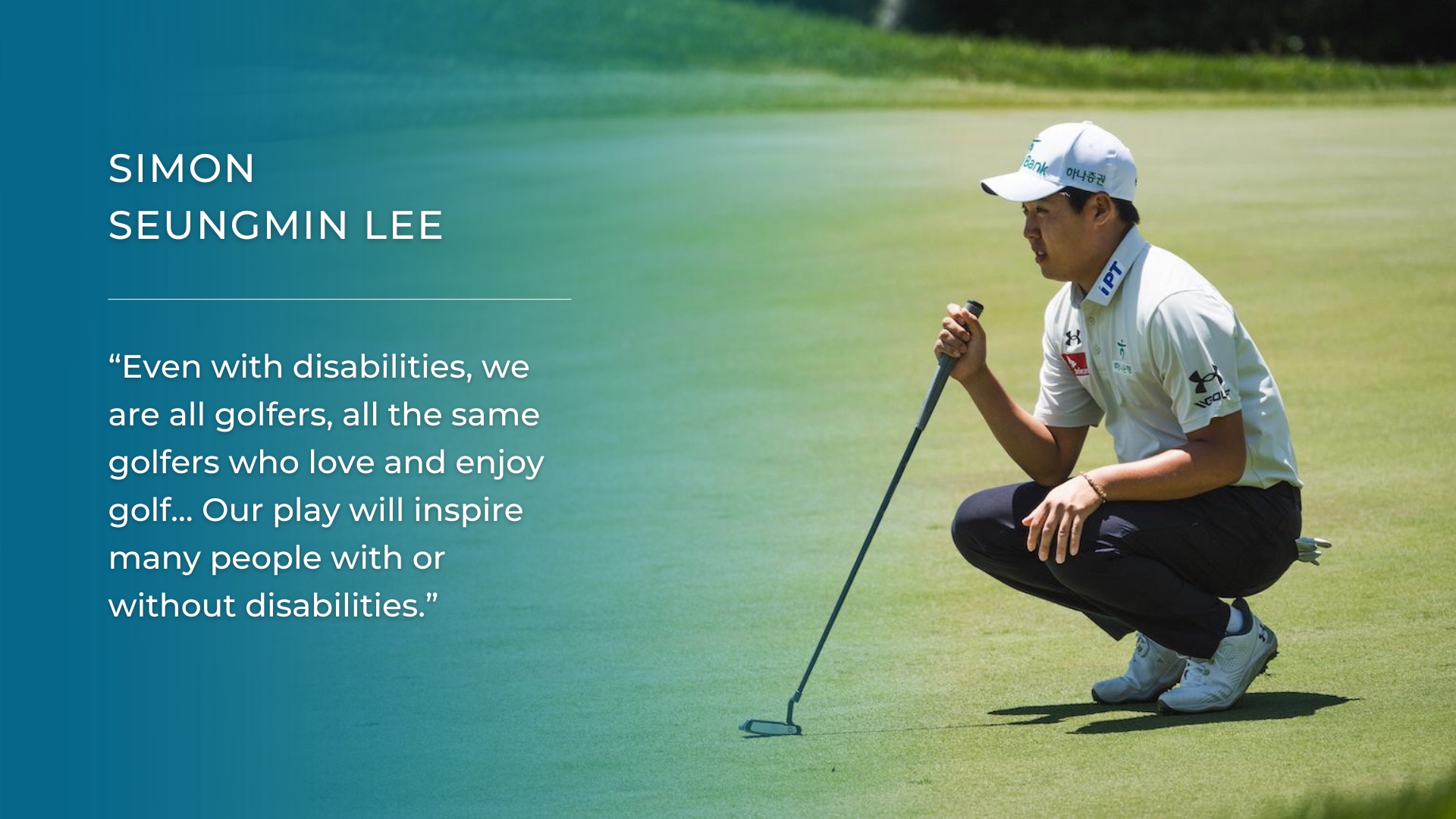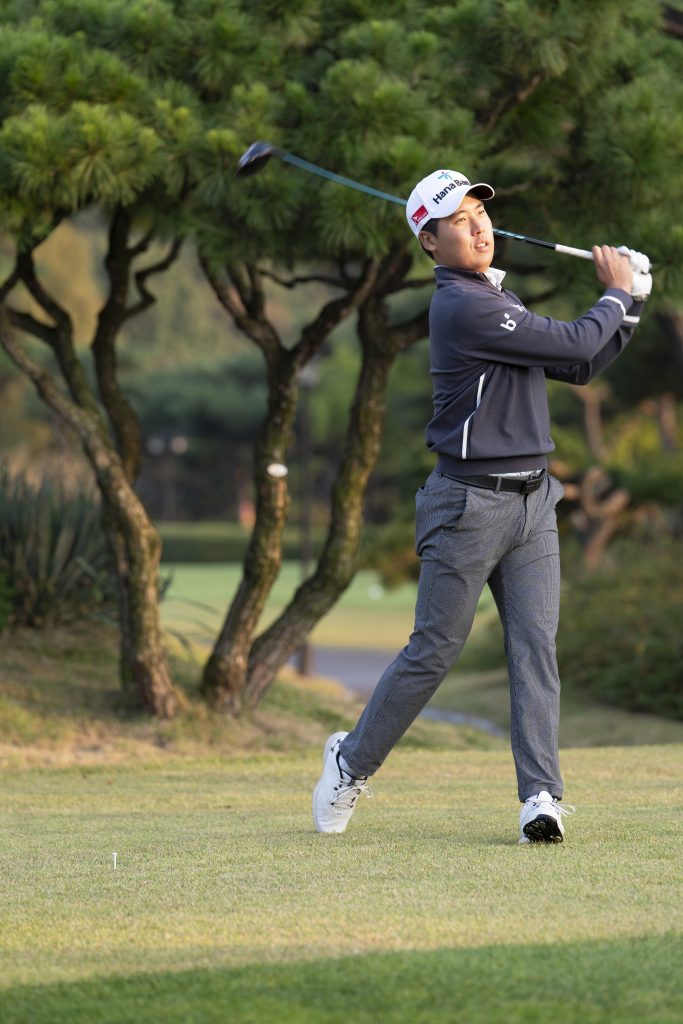
“They pulled me out of darkness and made me walk to the light of the world. They always encouraged my challenge,” said Simon Seungmin Lee, from the Republic of Korea.
The then 25-year-old spoke these words in 2022 when thanking his parents after his victory in the inaugural U.S. Adaptive Open (a tournament he has subsequently nearly won on two further occasions, including July, 2024).
Many of us can only imagine what it is like to work so hard in order to compete in high level golf, let alone hole the putts that win the trophy. And the first people Simon thanked were his parents.
To win his trophy, Simon, who is autistic, had to conquer the pressure of the big tournament which took place on the hallowed Pinehurst Resort Course No. 6; the environment containing many players, attending families and friends, spectators, and then he had to conquer the demands of the game itself that all players must face: to play his best golf from tee to green and until the ball rests at the bottom of the cup. It was two battles in one.
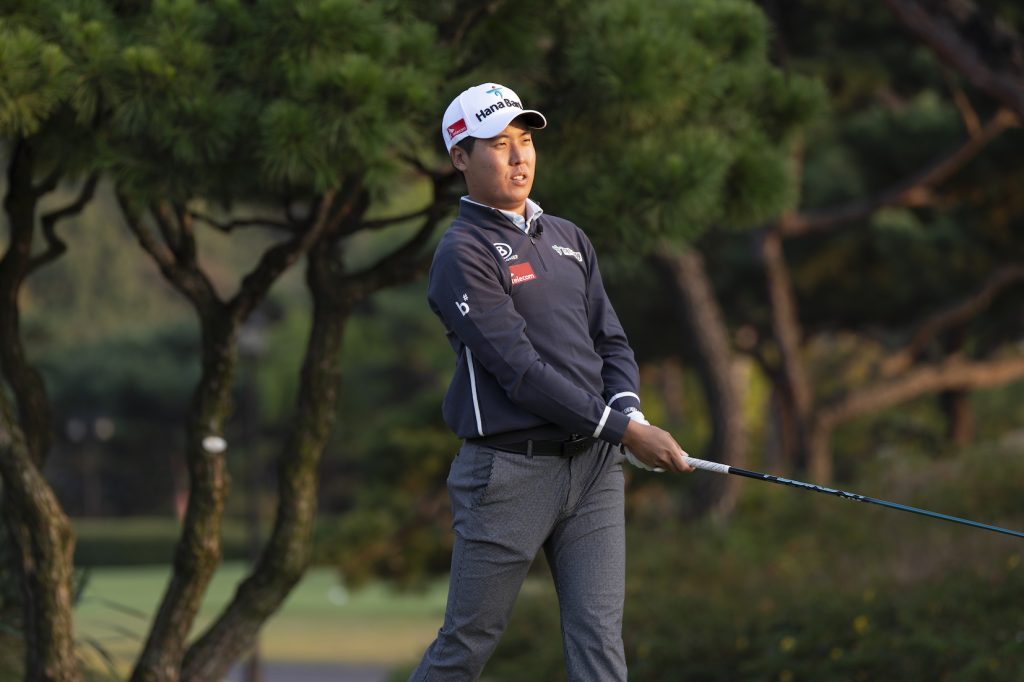
And having prevailed, Simon was still advancing to that light he mentioned, continuing his challenge. After his victory Simon said in his speech: “In the future, I will work harder to show even an adaptive golfer can compete on the PGA Tour. My wish is to be remembered as a golfer who never gave up.”
That was then. At the time of writing (July 2024) Simon Lee, who hails from Yongin, Gyeonggi Province, South Korea, was about to play in a third U.S. Adaptive Open in the heat of Kansas (Sand Creek Station GC, July 8-10), where he would again exhibit his outstanding qualities as a golfer. On the eve of the tournament Simon had earned his position of second place in the World Ranking for Golfers with Disability (WR4GD), not because of a sudden spike in form or like that of a meteorite falling out of a clear blue sky, but rather a star that has been rising steadily.
Rising by hard work and talent, the result of a run of highly impressive results, scorecards regularly inked with low scoring, playing with an impairment that can be difficult for others to understand.
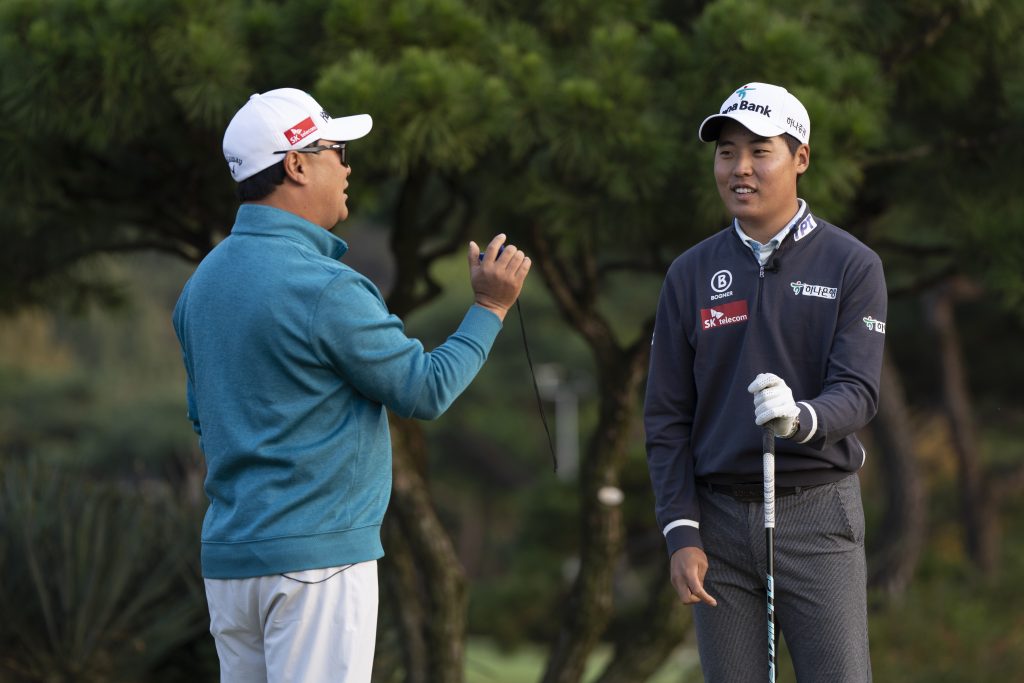
This highly skilled young golfer has faced, and still faces, significant challenges at golf events: from the preparation beforehand to managing himself and his game on course, from talking with players and officials, to decision-making during the round, and then speaking with media (sometimes in his second language of English), answering questions on the ‘how’ and the ‘why’ of his golf. For a young man most happy in the peace and quiet of the practice range or being in control over his ball on the fairway, this can be tough.
The son of a South Korean diplomat, Simon was diagnosed at three-years-old with a form of autism and developmental disability which makes it particularly difficult to communicate with others. But from a very young age, he always enjoyed playing outside. As long as it wasn’t raining, he wanted to go out and play golf (he struggled with the pronunciation and called it “golpeul”).
His father Myungyul explained: “Whenever he said this, I had to take him to the nearby park and play miniature golf with him before coming back home. After Simon started practising golf, one day I noticed that he was keeping his fist clenched all the time. Wondering what he was hiding, I made him open his hand, and there were blisters on his fingers. He had been hiding the injuries on his hand because he was afraid that if his parents found out, they wouldn’t let him play golf.
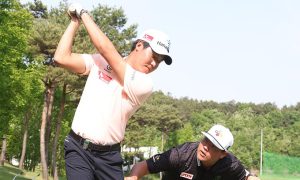
“When he was young he couldn’t make eye contact or have conversations with others. When he was among other people, he often acted and spoke in ways that set him apart, or he couldn’t control his behaviour. However, it was fascinating to see young Simon become remarkably serious and keep self-control whenever he held a golf club on the driving range or went out to play golf on the course.”
Simon’s own discovery that he was somehow different from other children came around the time when the family returned to Korea from the United States.
His father said: “Simon once asked his mother after coming back from school, ‘Mom, am I strange?’ My wife said to Simon, ‘Why? Did someone say that? You are ‘different’ but ‘extraordinary’.
“We’ve watched on YouTube an autistic person saying, ‘Being different is not a weakness, but it’s a real strength.’ Simon and my family always keep these words close to our hearts.”
Myungyul added: “To aid in treating Simon’s disability and improving his social skills, he was introduced to the team sport of ice hockey when he was a child. Given his love for physical activity, he enjoyed playing ice hockey and consistently practised, becoming proficient in skating, and skills like puck control and shooting. However, as he grew older, the game became more serious, and continuing to excel in this team sport required more complicated communication skills for preemptive play. He turned to golf, a sport he truly loved since starting to play. Golf allowed him to achieve visible results through individual practise and dedication, making it a sport he both enjoyed and excelled in.”
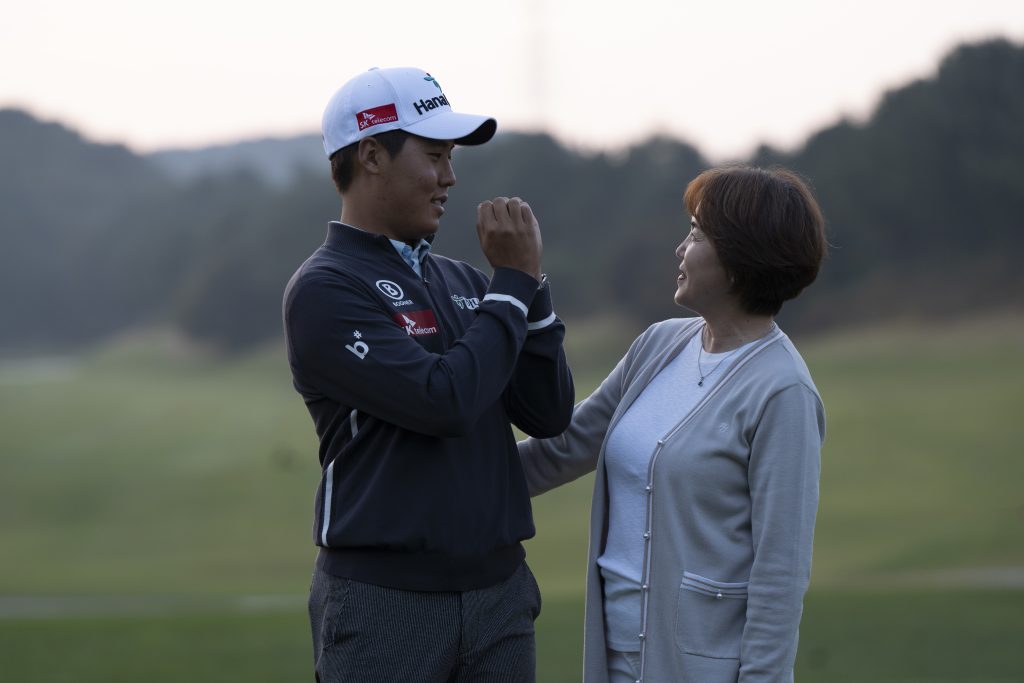
Back at Pinehurst in 2022, where Simon made his mark, in a piece for US magazine Golf Digest, writer Tod Leonard asked Simon’s mother, Jiae, what advice she would give other parents who have a child who is autistic. Jiae said: “Find what they love and continue to work on that. It may seem that it will be hard at first, but if you know that they love it, continue to push and don’t give up. And you’ll see that it’s not just something you’re feeding them, a hobby; it changes their character and personality overall.”
Such support for a young player doesn’t always just come from the family. Immediately after his win, Simon thanked his caddie and coach Seulgi Yun, saying: “He always pushes me to the limit and helps make me the best at what I am doing.”
Simon’s mother Jiae had watched as Simon and Seulgi plotted their way around Pinehurst with three consecutive rounds of 71 for a 3-under par total of 213, before defeating Sweden’s Felix Norrman in the play-off. It was a landmark win, with Simon letting out a loud cheer after the final green. And why not after all those hours of practise over the years.
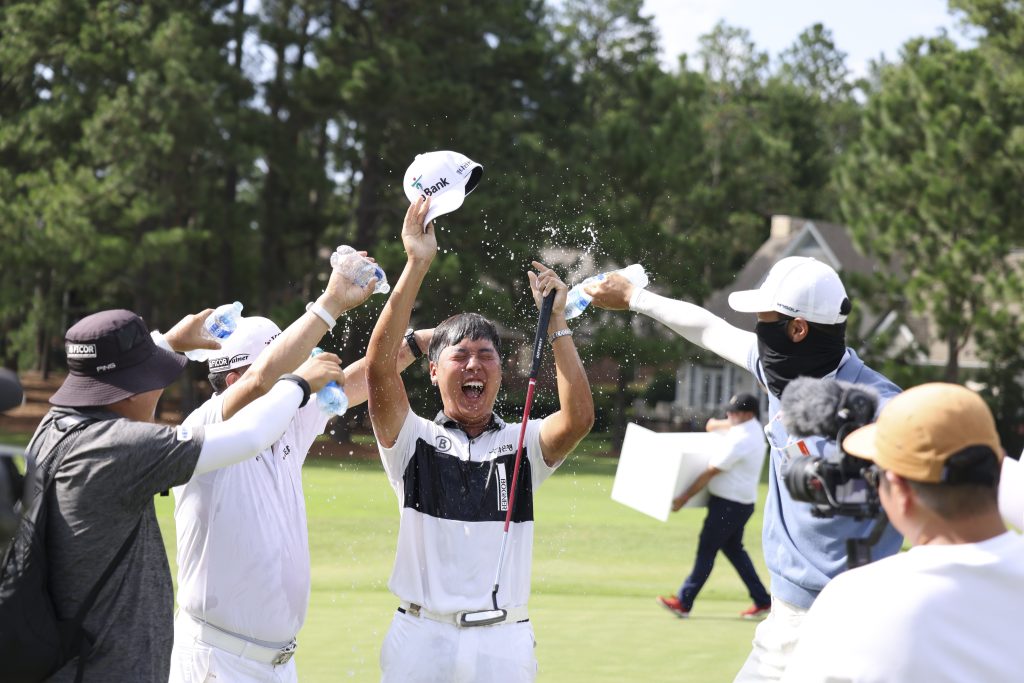
Myungyul said: “Unlike other children, he preferred watching the Golf Channel over kids’ shows on TV, and he especially loved watching Tiger Woods play. He enjoyed seeing the golf ball soar through the sky and loved travelling to different places for golf tournaments. After he started participating in junior golf tours, we took him to competitions in places like New York, North Carolina, Florida, and even Muirfield in Scotland, trying to provide him with as many opportunities and experiences as possible. We hoped that these experiences would help him overcome his autism and developmental challenges.
“Through golf, Simon was able to experience self-esteem and a sense of accomplishment, significantly aiding his cognitive development and providing him with life goals, which brought a significant change to his life. Moreover, golf, while played individually, also involved social interaction, requiring players to learn and adhere to its intricate rules and etiquette. This aspect greatly helped him in learning the basics of social life. Golf has taught him to control his behaviour, interact with others, and strive towards achieving goals, leading to a life very different from his early years.
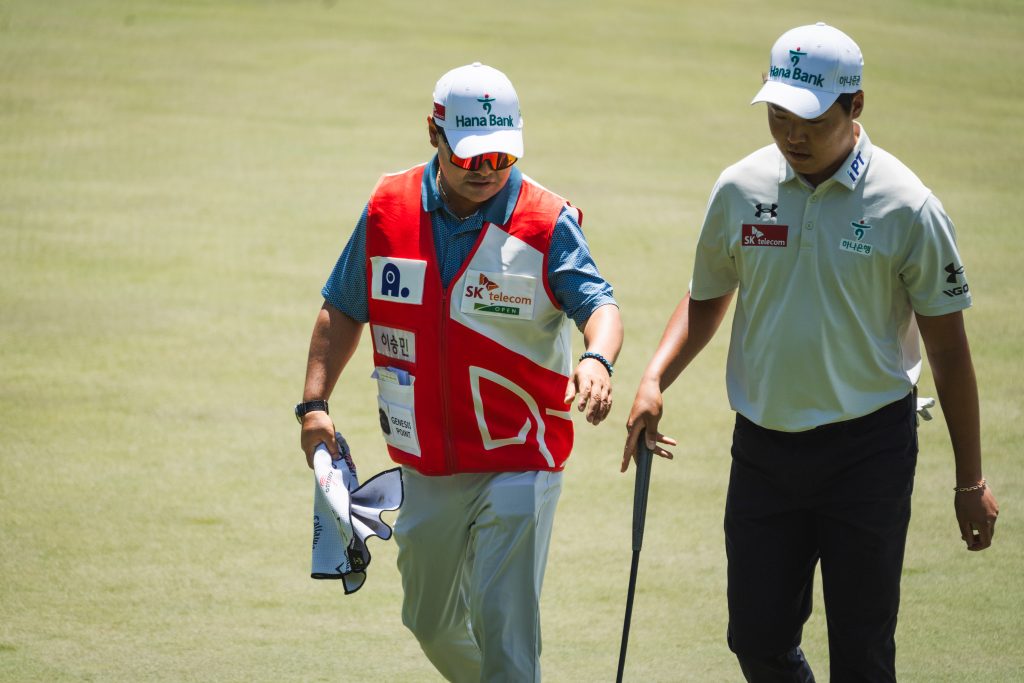
“I wondered what his life would be like if he hadn’t started playing sports and golf. Would he have become a hikikomori [a withdrawn person], staying in his room playing computer games all day? I can’t imagine Simon without golf.”
Simon Seungmin Lee: tour golfer
Playing his golf at home out of Suwon Country Club, Simon returned to Pinehurst last year to defend his title, which he attempted to do in some style, again playing well but ending just one shot behind England’s Kipp Popert, finishing in tied second place with Irishman Conor Stone. “We all know golf has changed our lives and the world….After winning the championship last year, I felt like I was soaring in the sky,” said Simon proudly.
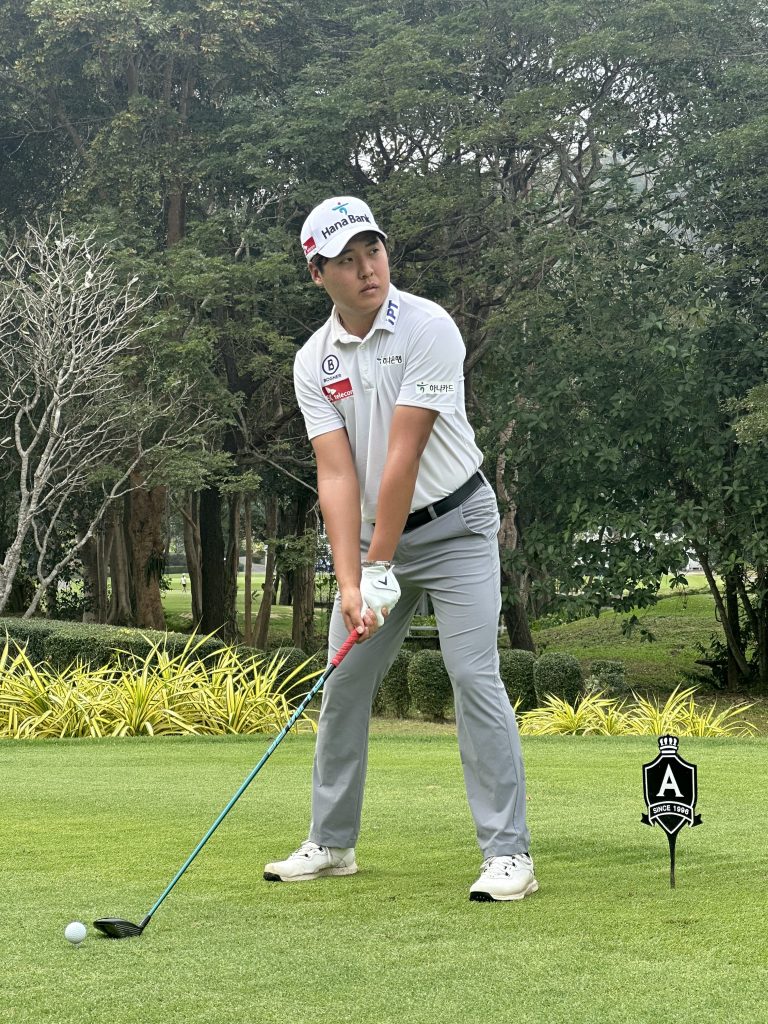
This star continues to rise in that sky. In April 2024, Simon played some great golf to win the 1st Glico Paragolf Championship at Kan Ucha Golf Club, Japan.
Then, two months later in June, at the 2nd Japan Grand Prix Open Golf Championship for People with Disabilities, held at Yokkaichi Country Club, Simon composed some of his most solid golf, compiling rounds of 67 and 69 to score 136. On a challenging course his 11 birdies and only three dropped shots left him a stunning 17 shots ahead of the field.
The form continued. In the July 2024 edition of the U.S. Adaptive Open, again Simon came close to a second title, claiming the runner-up spot – once more behind Kipp Popert.
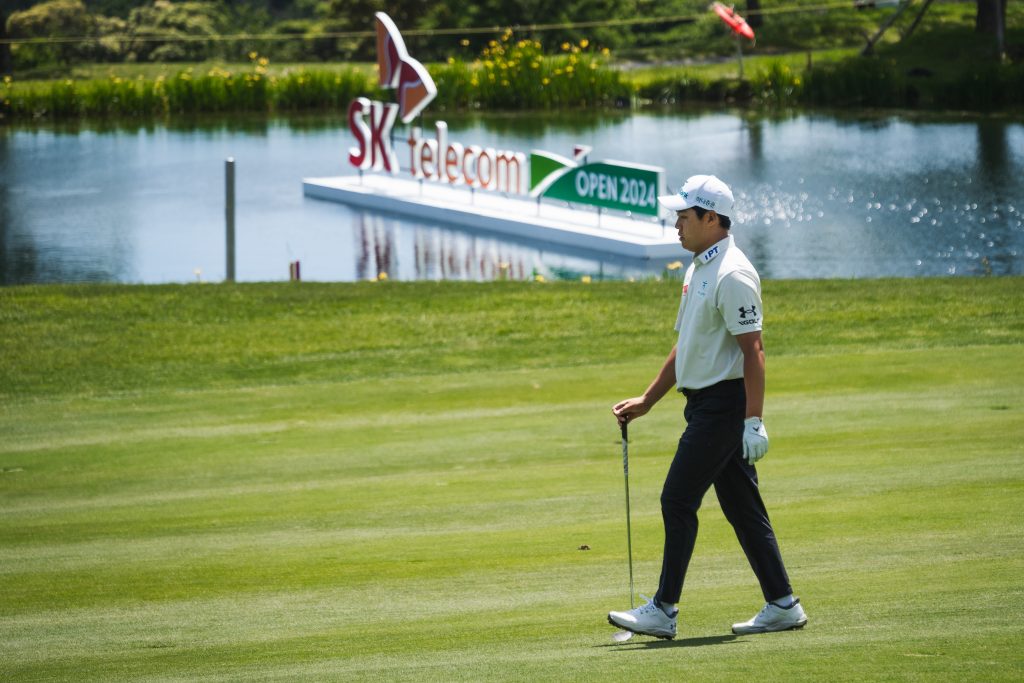
Simon’s progress in G4D (golf for the disabled) is mirrored by his ascendency as a professional player. In 2014 he earned a certificate as a semi-professional after passing a Korea PGA trial. Three years later in 2017 aged just 20 he achieved the “miracle” of getting tournament professional status at a selection tournament, this believed to be the first time in KPGA history to have a professional with a developmental disability joining the ‘pro’ ranks. Since then Simon has made the cut in professional tournaments in Korea.
“Now I am playing on the Korean tour, and I will challenge on the Korn Ferry Tour. It’s a tough job for me. But I want to prove that a golfer with disability can also become an excellent tour pro,” said Simon, thanking his strong supporters on his quest, including his sponsors.
Inspiring other players
Simon’s father said: “The psychiatrist who diagnosed Simon’s disability when he was young advised us parents not to compare him with others but to help him be better today than he was yesterday, and better tomorrow than he is today. Like everyone else, he is competing against himself in life and in golf. How far he can go and how much he can achieve is something neither he nor his parents can know; only God knows.”
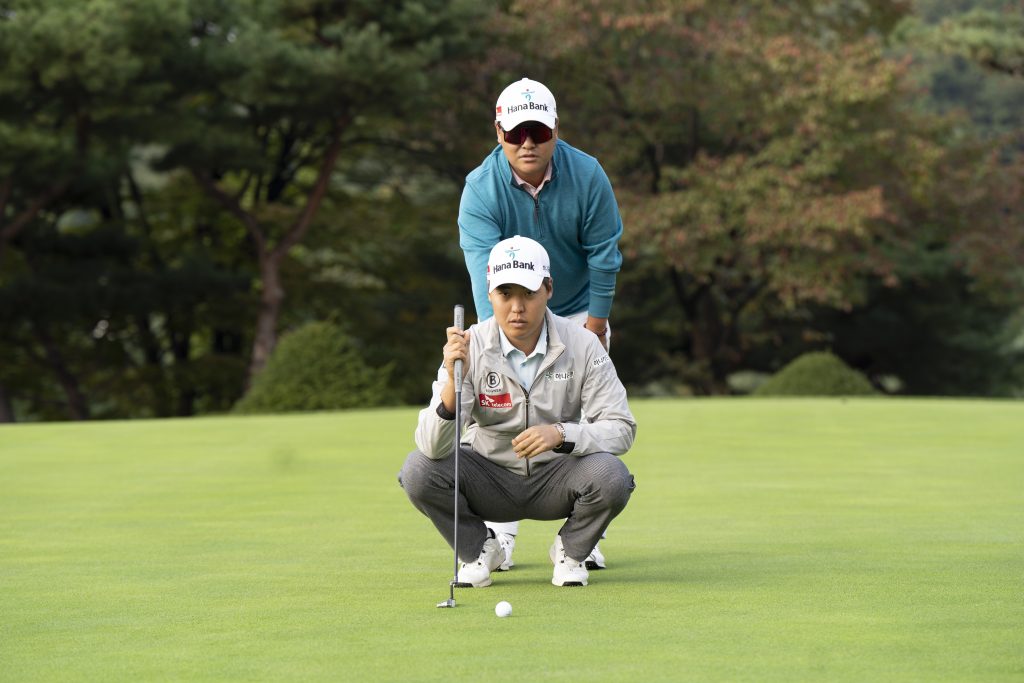
Alongside his professional aspirations Simon is still very much conscious of his growing role to fly the flag to encourage other people with disabilities, including of course those with autism, to join in on the inclusive player pathway, as possible complete beginners trying the sport for the first time, as regular players, or as competitors at any level.
Simon explains this well. He said recently: “Even with disabilities, we are all golfers, all the same golfers who love and enjoy golf… Our play will inspire many people with or without disabilities.”
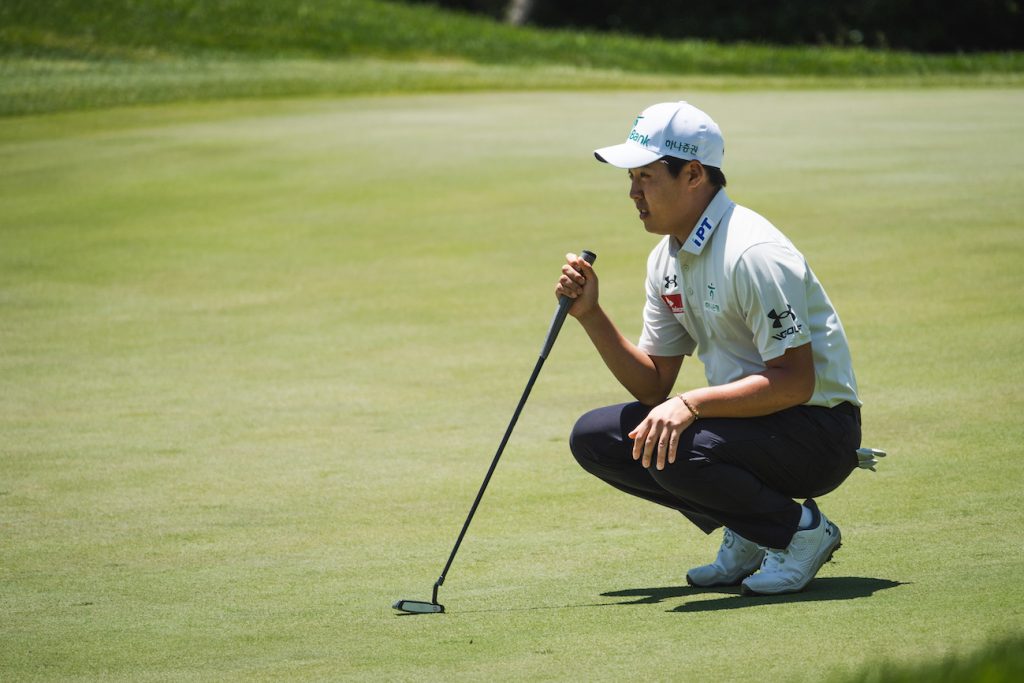
Clearly, his family and Simon himself have never given up on his dream to reach the top. Back in 2022, Simon had revealed a dream of one day playing in The Masters at Augusta and walking on the 18th hole at that iconic course. It is surely only right that Simon should try for this.
After all, shooting stars have been seen many times in the night sky over Georgia before. So why not one more?
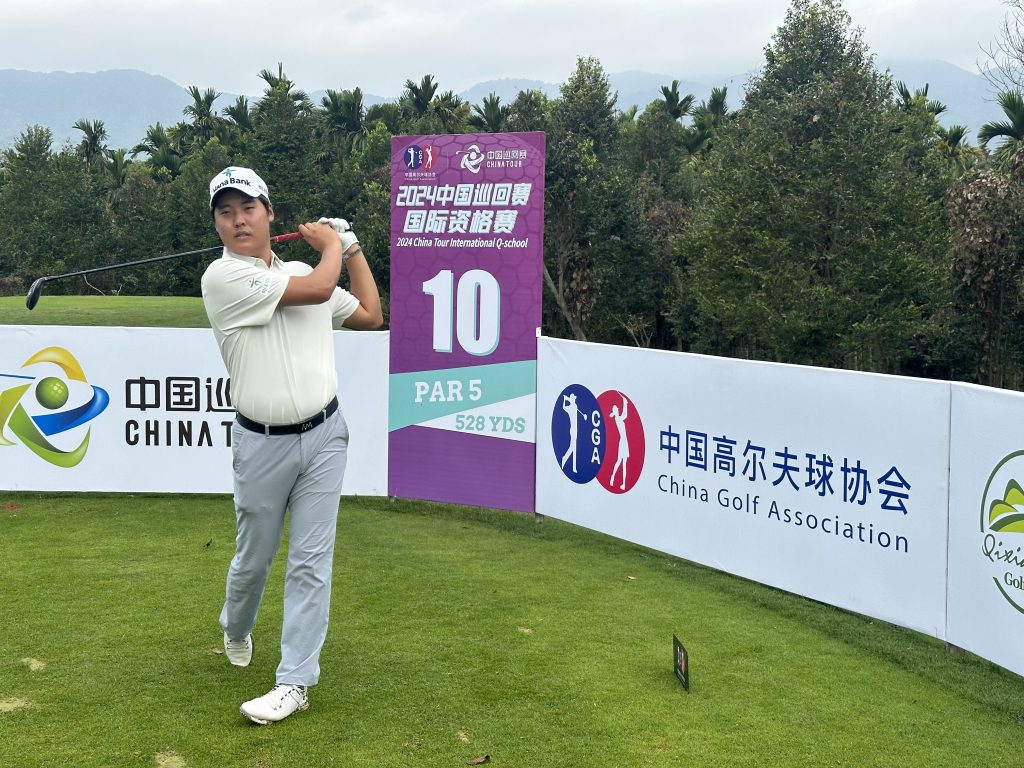
NB: When using any EDGA media, please comply with our copyright conditions


